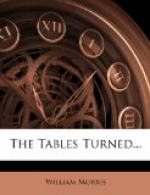Mr. Hungary, Q.C. I am for the prosecution, my lord, instructed by the Secretary of State for the Home Department. (JUDGE bites his pen and nods.) My lord, and gentlemen of the Jury, although this case may seem to some ill-judging persons a trivial one, I think you will be able to see before it is over that it is really important in its bearing on the welfare of society, the welfare of the public; that is, of the respectable public,—of the respectable public, gentlemen. For in these days, when the spirit of discontent is so widespread, all illegal actions have, so to say, a political bearing, my lord, and all illegal actions are wicked, gentlemen of the Jury, since they tend towards the insecurity of society, or in other words, are definitely aimed at the very basis of all morality and religion. Therefore, my lord, I have received instructions from the Home Secretary to prosecute this woman, who, as I shall be able to prove to you, gentlemen of the Jury, by the testimony of three witnesses occupying responsible official positions, has been guilty of a breach at once of the laws of the country and the dictates of morality, and has thereby seriously inconvenienced a very respectable tradesman, nay (looking at his brief) three respectable tradesmen. I shall be able to show, gentlemen, that this woman has stolen three loaves of bread: (impressively) not one, gentlemen, but three.
A Voice. She’s got three children, you palavering blackguard!
[Confusion.
Mr. Justice N. (who has made an elaborate show of composing himself to slumber since the counsel began, here wakes up and cries out) Arrest that man, officer; I will commit him, and give him the heaviest punishment that the law allows of.
[The USHER dives among the audience amidst great confusion, but comes back empty-handed.
J. N. A most dangerous disturbance! A most dangerous disturbance!
Mr. H. Gentlemen of the Jury, in confirmation of my remarks on the spirit that is abroad, I call your attention to the riot which has just taken place, endangering, I doubt not, the life of his lordship, and your own lives, gentlemen, so valuable to—to—to—in short, to yourselves. Need I point out to you at any length, then, the danger of allowing criminals, offenders against the sacred rights of property, to go at large? This incident speaks for me, and I have now nothing to do but let the witnesses speak for themselves. Gentlemen of the Jury, I do not ask you to convict on insufficient evidence; but I do ask you not to be swayed by any false sentiment bearing reference to the so-called smallness of the offence, or the poverty of the offender. The law is made for the poor as well as for the rich, for the rich as well as for the poor. The poor man has no more right to shelter himself behind his poverty, than the rich man behind his riches. In short, gentlemen of the Jury, what I ask you in all confidence to do, is to do justice and fear not.—I call Sergeant Sticktoit.




